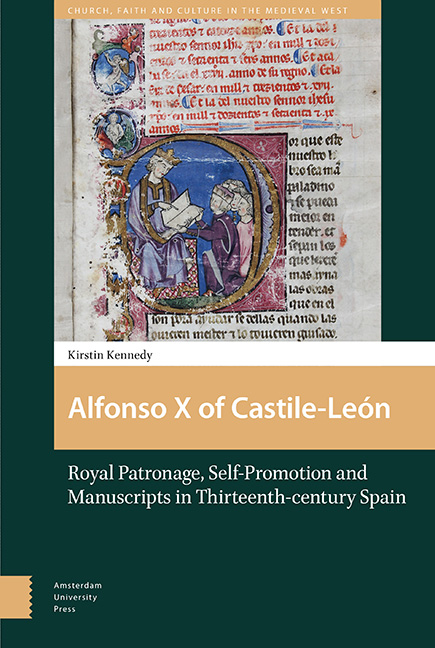 Alfonso X of Castile-León
Alfonso X of Castile-León Book contents
- Frontmatter
- Dedication
- Contents
- Acknowledgements
- List of Figures
- Abbreviations
- Introduction: ‘the king Makes a Book’
- 1 Alfonso X, his Literary Patronage, and the Verdict of Historians
- 2 Alfonso in his Texts: literary Models and Royal Authorship
- 3 Reality, Politics, and Precedent in Images of Alfonso
- 4 Codices Laid Out for a King : the Appearance and Production of Alfonsine Manuscripts
- 5 The Circulation of Alfonsine Texts: Astrological Works and Chronicles
- Concluding Remarks
- Manuscript Sources
- Index
Introduction: ‘the king Makes a Book’
Published online by Cambridge University Press: 21 November 2020
- Frontmatter
- Dedication
- Contents
- Acknowledgements
- List of Figures
- Abbreviations
- Introduction: ‘the king Makes a Book’
- 1 Alfonso X, his Literary Patronage, and the Verdict of Historians
- 2 Alfonso in his Texts: literary Models and Royal Authorship
- 3 Reality, Politics, and Precedent in Images of Alfonso
- 4 Codices Laid Out for a King : the Appearance and Production of Alfonsine Manuscripts
- 5 The Circulation of Alfonsine Texts: Astrological Works and Chronicles
- Concluding Remarks
- Manuscript Sources
- Index
Summary
From the vantage point of today, the literary patronage of Alfonso X (reigned 1252–1284) ‘the Learned’ (el Sabio) –, ruler of Castile and León (united in 1230 under his father Fernando) and of Islamic kingdoms recently incorporated into Christian ones such as Murcia, Seville, and Niebla – seems extraordinary for its time, in the context not only of Spain but also of the whole of thirteenth-century Europe. Praised by a contemporary for studying ‘worldly and heavenly kinds of knowledge’, he initiated what appears to have been a coherent programme of scholarship in Castilian, commissioning translations from the Arabic of astronomical works, sponsoring legal and historical compilations, as well as composing devotional poetry in praise of the Virgin Mary. His decision to promote the Castilian language was not a casual one. It was the principal language of his chancery and of the Christian population in the largest of his kingdoms, Castile, a kingdom which from the 1230s until the 1260s had undergone a period of further expansion as it absorbed the Islamic states which had submitted to his father Fernando and to Alfonso himself while still a prince and later when he became king.
Alfonso's consistent patronage of works in the vernacular, at a date when Latin was the language of European scholarship, was remarkable, although the immediate consequence was that the works bearing his name, even the scientific ones, enjoyed limited circulation beyond his kingdoms. Despite this, some historians have argued that his decision was due to his desire to unite a kingdom of disparate languages (principally Arabic and Castilian) and faiths (Christian, Muslim, and Jewish) in a language and culture that would be common to all. More recently, however, the utopian ideal that this analysis implies has yielded to more hard-headed reassessments of his literary patronage. In the words of one historian, ‘The Alphonsine cultural project should not, perhaps, be understood as an abstract reflection of enlightened toleration; rather the king's interest in translation was […] an instrument of proto-absolutist, colonial control.’
- Type
- Chapter
- Information
- Alfonso X of Castile-LeónRoyal Patronage, Self-Promotion and Manuscripts in Thirteenth-century Spain, pp. 15 - 44Publisher: Amsterdam University PressPrint publication year: 2019


